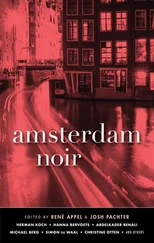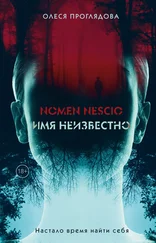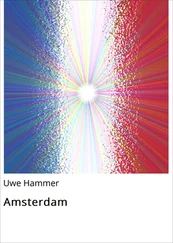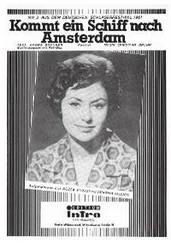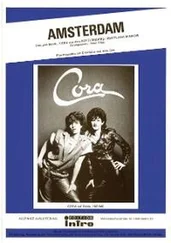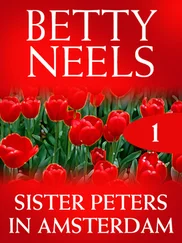“You know, Koekebakker, how at your last job you had to ask every evening before you could go home if the receipt was on the spindle?”
“Sure.”
“And how every time you asked that you felt like you had muttonchop sideburns?”
“Definitely.” “So, it was like that. I thought about you and I felt like I was turning into a ‘fellow’ like that guy, just from him sitting there across from me. I thought, I’m about to start talking about intellectual currents, where are these words even coming from? It all happened in just the time it took for the guy to start up again and say, ‘Sir, you …’”
Again we fell silent. In the long run, you can’t fight them, there are so many of them and they’re always right. They had a reason to exist. We were the ones with no reason to exist. That’s the way it had to be, it was God’s will. Bekker looked down at the ground, between his knees.
“How did you get rid of him?” I asked. “I was furious,” Bavink said. “Goddammit, I can’t help it if I paint my pictures and I have to sell them. But I kept my wits about me. I interrupted and said: ‘Sir,’ I said, ‘I am terribly sorry to have nothing to offer you, but there’s nothing in the house.’ I was talking as fancy as I could. ‘I regret to say that I don’t believe we understand one another.’ He raised his eyebrows. ‘Perhaps we might understand each other better in ten years, but today, we do not understand each other.’ I stood up and he stood up too. ‘I appreciate your good intentions …’”
“I appreciate your good intentions!” Bekker said.
“That’s what I said,” Bavink said. “Where did those words come from? ‘I appreciate your good intentions, but I’m afraid I don’t think we have one single intelligent word to say to each other. If there is anything else about me you’d like to know, may I suggest you pay a visit to Mister Hoyer …’”
“What?!” both of us cried at the same time.
“‘Pay a visit to Mister Hoyer,’ I said, ‘on Van Woustraat, he can tell you everything you need to know and he talks like a newspaper. 28 Van Woustraat.’”
We sat there thunderstruck.
The fellow had stayed perfectly polite, he wrote down the address with a fountain pen, thanked Mister Bavink, and said, “Don’t trouble yourself, I can find my way out, thank you.”
“If the guy plays his cards right,” Bekker said — who owned his own business, and looked up with his head still in his hands—“he’ll get a nice little article out of that. It doesn’t matter about Hoyer, he deserves it.”
And again we sat silent and thought about how we had no reason to exist.
This was written many years ago, in a distant time, probably 1913 or 1914.
1. Discovery
BAVINK and Bekker walked up ahead, then came Kees on his own. They had stuck me with Hoyer. It was a November afternoon; the low sun was behind us, above the middle of the Zeeburgerdijk. Hoyer walked with his coat unbuttoned — the only overcoat between the five of us. It was an especially beautiful, mild day. Pastures spread out on the low ground to the right, pale green and sodden. In front of us, at the foot of the dike, the trees in the Jewish Cemetery stood tall and gnarled and cast a pale purple reflection. The sky above our heads was pale blue; when we turned around we saw the sun shining in the Spui canal and the sides of run-down wooden sheds that were usually just ugly gray boards, but they were shining in the light, the whole world all around us was shining in the light, the earth gave off light and the world was ours for as far as our eyes could see, and farther.
We were walking out of the city, walking hard, the soles of Hoyer’s shoes (which were intact) clattered on the stones. Bavink brandished his walking stick above his head and I gave Hoyer a little shove. We were in high spirits, and excited about nothing, about the weather, the sunshine, the light all around us that we breathed and the sky above us that we saw. We were heading out to conquer the world, except for Hoyer, he was the only one who didn’t believe in that, all he knew was that he was out for a walk on Zeeburgerdijk, past the slaughterhouse.
But when we came to the end of the dike and saw the Zuiderzee before us, Hoyer fell silent too, as silent as the water, which was as white-blue as the sky above. To the north, behind the levee, the Outer IJ was chalk-white. A barge and a little tugboat were steaming in toward the city, from east to west; they were on the other side of the levee but their steam was reflected in the water on this side. And a tjalk was sailing there with a white sail, its clew listing to port. Farther past it was Durgerdam, with its houses on the dike and its two little towers and a few bare trees black between them, and along the quay a few very small ships with their puny masts reaching up into the sky. To the right, offshore, there was smoke from invisible steamships.
God was good that afternoon, and merciful. His world came in through our eyes and lived in our heads, and our thoughts went wordlessly out across the world, far beyond the horizon they went. And so we and the world took turns flowing into and through each other: Bekker said he could feel his heart swell and when I shut my eyes tight it was as though my head was filled with golden light and blue water, and wonderful shivers ran up and down my spine. I felt the world that lay around me.
We walked farther. Someone had turned the soil in a little garden next to a house and the wet black clumps of earth glowed dully. There was a low dog-rose hedge around it, the sun shone down on it. A man was spading the last corner. His smock was light blue with a dark square piece on the front. And just when the man straightened up to look at us the sun shone onto his face. Now little pink clouds were reflected in the sea.
On the dike to Schellingwoude we ran into a Reformed-looking gentleman; his white face was clean-shaven, he was wearing a black tailcoat, but he had his hat in his hand and his overcoat draped over his arm and he was whistling. It was November 22. We liked him and wanted to shake his hand but were worried he wouldn’t understand us and his face was so terribly white.
At four o’clock the sun was very low in the sky, big and red, and it sank cold and dull behind a shed on the Amsterdam harbor. Loneliness crept up out of the marshland past the dike, to the east; at the end of the dike lay a pool lined with brown reeds — abandonment itself.
In the distance, on the Outer IJ dike, was a baker’s wagon being pulled behind a white horse, and we thought about the raisin bread inside it, since it was Saturday. And in one lonely house a single tea light was burning on the table, right next to the window with little tulle curtains pulled back to both sides. The teapot sat on the tea light, and our hearts completely melted, we would conquer the world some other time, for now we were thinking more about having something to eat and drink, bread and coffee, because it was getting cold, and about the floor sprinkled with white sand and the stove in the little café in Schellingwoude.
We sat quietly by the window in the café. I looked out to the east along the dike, at the couple of scrawny, windswept trees at the water’s edge, at the water, and the sky turning darker. And then Hoyer, sitting across from me, said, “Look at that sky.”
To the southwest the whole sky was yellow. And I turned to sit sideways on my chair and look, and I saw that it was good, everything was good as it was and there was nothing left to conquer, and I was alive.
When we walked along the dike between Schellingwoude and Nieuwendam with the IJ harbor on our left and the endless fields on our right, the water was blazing yellow all the way to the city; on the other side, the ditches ran off into the countryside and were tinged with pink, so lightly that at first I thought it must be from my eyes having looked into the sun so much.
Читать дальше
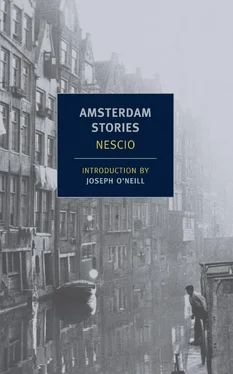


![Олеся Проглядова - Nomen nescio. Имя неизвестно [litres]](/books/391740/olesya-proglyadova-nomen-nescio-imya-neizvestno-lit-thumb.webp)
